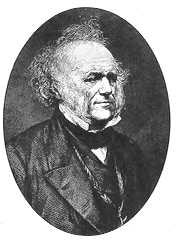 Charles Lyell was born in
Scotland in 1797, the eldest of ten
children. Lyell's father, also named Charles, was a botanist of minor
repute and first exposed the younger Charles to the study of nature.
Charles spent much of his childhood at the family’s other home, Bartley
Lodge in the New Forest, England, where his interest in the natural
world was sparked. At Exeter College, Oxford, Lyell encountered geology
as a serious profession as he was taken under the wing
of William Buckland. Upon graduation he took a professional detour into
the law, but dabbled in geology, writing numerous influential books and
papers.
Charles Lyell was born in
Scotland in 1797, the eldest of ten
children. Lyell's father, also named Charles, was a botanist of minor
repute and first exposed the younger Charles to the study of nature.
Charles spent much of his childhood at the family’s other home, Bartley
Lodge in the New Forest, England, where his interest in the natural
world was sparked. At Exeter College, Oxford, Lyell encountered geology
as a serious profession as he was taken under the wing
of William Buckland. Upon graduation he took a professional detour into
the law, but dabbled in geology, writing numerous influential books and
papers.Principles of Geology, Lyell's first book, was also his most famous, most influential, and most important. First published in three volumes in 1830-33, it established Lyell's credentials as an important geological theorist. In it he introduced the doctrine of uniformitarianism. The central argument in this text was based on the observation that "the present is the key to the past." This means that geological remains from the distant past can, and should, be explained by reference to geological processes now in operation and thus directly observable. Lyell's interpretation of geologic change as the steady accumulation of minute changes over enormously long spans of time was also a central theme in the Principles of Geology, and it was a powerful influence on the young Charles Darwin, who brought the first edition with him aboard H. M. S. Beagle in the 1830s.
(http://www.victorianweb.org/science/lyell.html)